Lusitanic
Lusitanians (Portuguese: Luso, Lusitano), from Latin: Lusitanicus, adjective from Lusitania, the name of a Roman province in the Iberian Peninsula. Lusitania is one of the two official names for Portugal in the Latin language, especially in the Vatican State, as it was also informally or formally, one of the two names used for the country in literature, cartography and written documents throughout Europe since the late medieval period. Lusitanic, on the other hand, is a term used to categorize persons who share the linguistic and cultural traditions of the Portuguese-speaking nations and territories of Portugal, Brazil, Macau, Timor-Leste, Angola, Mozambique, Cape Verde, São Tomé and Príncipe, Guinea Bissau and others.
Luso- is a Late Latin prefix used to denote Portuguese- in conjunction with another toponym or demonym. The word is derived from Lusitania, the Latin name for what would be modern Portugal. Lusitania was an ancient Roman province including approximately all of modern Portugal south of the Douro river and part of modern Spain (the present autonomous community of Extremadura and a small part of the province of Salamanca, Castile and León). It was named after the Lusitanians or Lusitanian people (an Indo-European people). Its capital was Emerita Augusta (currently Mérida, Spain), and it was initially part of the Roman Republic province of Hispania Ulterior, before becoming a province of its own in the Roman Empire. The etymology of Lusitania, like the origin of the Lusitani who gave the province their name, is unclear. By popular etymology in previous centuries, the name was connected to a supposed Roman demigod Lusus combined with an invented Celtic word: Lus and Tanus, "tribe of Lusus"; others connected Luso with the Celtic god Lugh.[1]
Lusophone (not to confuse with Lusitanian) is someone who speaks the Portuguese language, either as a native, as an additional language, or as a learner. As an adjective, it means "Portuguese-speaking". The word itself is derived from the name of the ancient Roman province of Lusitania, which covered most of the part of the Iberian peninsula that is today the Republic of Portugal and part of Spain.
Etymology
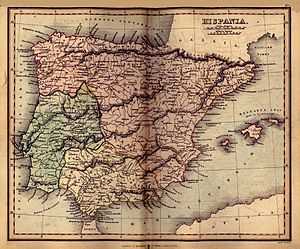
The term derives from the name of one tribe, the Lusitani, that lived in the Western part of the Iberian Peninsula, prior to the Roman conquest; the lands they inhabited were known as Lusitania. The Lusitani were mentioned for the first time, by Livy, as Carthaginian mercenaries who incorporated the army of Hannibal, when he fought the Romans.
After the conquest of the peninsula (25–20 BC) Augustus divided it into the southwestern Hispania Baetica and the western Hispania Lusitania that included the territories of Asturia and Gallaecia, Celtic regions. In 27 BC the Emperor Augustus made a smaller division of the province: Asturia and Gallaecia were ceded to the jurisdiction of the new Provincia Tarraconensis, the former remained as Provincia Lusitania et Vettones. The Roman province of Lusitania comprised what is now central and south Portugal and parts of modern-day north-central Spain.
Other definitions include Galicia, because Portuguese and Galician share close linguistic and cultural ties, Celt ties; having both derived from the ancient Portuguese-Galician and the term is cultural classification, rather than a Historic-Geographical definition. However, in the Roman times, the Gallaeci were not part of the Lusitania province.
Despite all this, the language was born in the old Gallaecia which comprise what is now Galicia and the region where Portugal was born, north Portugal.
The term is used like the ones used in other countries that were derived from the long-standing custom among many European countries to revive the Roman names of their country or the name of tribes who lived in it in Roman times, with establishing a "Roman Connection" being considered a way of gaining respectability and legitimacy. In the case of Portugal, use of the term "Lusitan" and its derivatives is attested, for example, in the first Portuguese dictionary "Dictionarium ex Lusitanico in Latinum Sermonem" published in 1569 or the epic poem Os Lusíadas published in 1572 . A rival Roman-era term available to the Portuguese was Iberia - but since it referred to the entire peninsula it could be used, and was indeed used, also by the Spanish.
Portuguese use of "Lusitania" is parallel to the use of Gallia in France, Britannia in England, Caledonia in Scotland, Hibernia in Ireland, Batavia in the Netherlands, Helvetia in Switzerland and Germania in Germany (called "Deutschland" in its own inhabitants' language). Belgium got its actual present name from the Roman Belgica.
Portuguese-speaking countries and regions
| Portuguese speaking countries |
 |
Portuguese identified as an official or de facto language. |
Today, Portuguese is among the most commonly spoken first languages of the world. During the period of the Portuguese Empire from 1415 to 2002, many people migrated from Portugal to the colonized lands. These settlers brought the Portuguese language, which was the, for the majority of the time, mostly spoken by the government and those of wealth, as the natives, who were generally poor under the regime, retained many of their native languages or created Portuguese Creole Languages.
With the recent fall of the Portuguese Empire, many white Portuguese settlers moved back to Portugal and Portuguese literacy rates dropped. With the establishment of the Community of Portuguese Language Countries and the Instituto Camões, Portuguese has been promoted and special programs have been created to promote Portuguese language and its teaching. Culturally, Portuguese are typically European and are believed to be the one of the longest continuously established population in Europe; they also have small traces of many peoples from the rest of Europe, the Near East and the Mediterranean areas of northern Africa.[2] The Lusitanian countries, including Portugal, are also inhabited by peoples of non-Portuguese ancestry, to widely varying extents.
Language and ethnicities in Portuguese-speaking areas around the world
| Continent/Region | Country/Territory | Languages Spoken [3] | Ethnic Groups [4] | Picture | References |
|---|---|---|---|---|---|
| Europe | Andorra | Catalan (official) 38.1%, Spanish 39.7%, Portuguese 14.5%, French 8.5% | 36.6% Andorran,33.0% Spanish, 16.3% Portuguese, 6.3% French,7.8% others. | |
[5][6] |
| Galicia | Castilian and Galician are the official languages and the languages spoken. Portuguese is observed as a regionally recognised language in some southern isolated areas. | 88% Galician and 12% other Spanish people (9%) and from other countries (3%) |  |
||
| Luxembourg | Luxembourgish (official), French (official), German (official), Portuguese (largest non-official language) | 62% Luxembourger, 38% foreign (over 1/3 of foreign population is Portuguese) | |
[7] | |
| Portugal | Portuguese (official), Mirandese (official regional) - (Portuguese is spoken by 100% of the population, over 100% indicates bilingual population). | 96.87% Portuguese and 3.13% legal immigrants (2007) |  |
[8][9] | |
| South America | Brazil | Portuguese (official and most widely spoken language) | white 53.7%, pardos (brown people, accultured native populations or mixed white, black and/or amerindian) 38.5%, black 6.2%, other (includes Asians, other Latin Americans, Pacific Islanders and Indigenous Brazilians) 0.9%, unspecified 0.7%. Defined by skin color and not ethnicity. Multiracial people can both self-identify and be accepted as white, black, Asian or Amerindian. (2000 census) | .png) |
[10] |
| Africa | Angola | Portuguese (official) - Kikongo, Chokwe, Umbundu, Kimbundu, Ganguela, Kwanyama spoken | Ovimbundu 37%, Kimbundu 25%, Bakongo 13%, mestiço (mixed European and native African) 2%, European 1%, other 22% | [11] | |
| Cape Verde | Portuguese (official) - Cape Verdean Creole (regional) | Creole (mulatto) 71%, African 28%, European 1% | 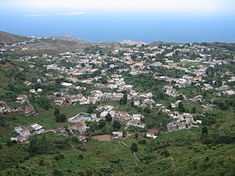 |
[12] | |
| Equatorial Guinea | Portuguese (official), (Spanish and French are official) | Fang 85.7%, Bubi 6.5%, Mdowe 3.6%, Annobon 1.6%, Bujeba 1.1%, other 1.4% (1994 census) | 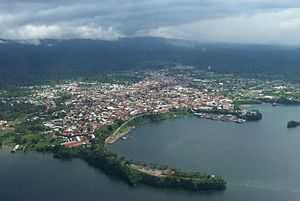 |
[13] | |
| Guinea-Bissau | Portuguese (official) - Guinea-Bissau Creole (regional) | African 99% (includes Balanta 30%, Fula 20%, Manjaca 14%, Mandinga 13%, Papel 7%), European and mulatto less than 1% |  |
[14] | |
| Mozambique | Emakhuwa 26.1%, Xichangana 11.3%, Portuguese 8.8% (official; spoken by 27% of population as a second language), Elomwe 7.6%, Cisena 6.8%, Echuwabo 5.8%, other Mozambican languages 32%, other foreign languages 0.3%, unspecified 1.3% (1997 census) | African 99.66% (Makhuwa, Tsonga, Lomwe, Sena, and others), Europeans 0.06%, Euro-Africans 0.2%, Indians 0.08% |  |
[15] | |
| São Tomé and Príncipe | Portuguese (official) | mestiço, angolares (descendants of Angolan slaves), forros (descendants of freed slaves), serviçais (contract laborers from Angola, Mozambique, and Cape Verde), tongas (children of serviçais born on the islands), Europeans (primarily Portuguese) | 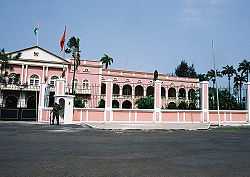 |
[16] | |
| Asia | Macau | Portuguese,[17] Cantonese 85.7%, Hokkien 4%, Mandarin 3.2%, other Chinese dialects 2.7%, English 1.5%, Tagalog 1.3%, other 1.6% (2001 census) | Chinese 94.3%, other 5.7% (includes Macanese - mixed Portuguese and Asian ancestry) (2006 census) | 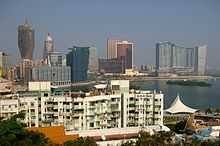 |
[18] |
| East Timor | Tetum (official), Portuguese (official), Indonesian, English | Austronesian (Malayo-Polynesian), Papuan, small Chinese, European (most of Portuguese origin) and mestiço minorities |  |
[19] | |
| The CIA World Factbook is in the public domain. Accordingly, it may be copied freely without permission of the Central Intelligence Agency (CIA).[20] | |||||
Relation with Hispanic
There has often been debate as to whether Lusitanians are Hispanics." Lusitania and the Lusitanians were known long before their conquest by the Roman Empire (Livy 218 b.c.) and incorporated in the Roman province of Hispania thus can not be considered a subset of "Hispanic." In the United States, the term "Hispanic" was first adopted by the administration of Richard Nixon and today is one of the several terms of ethnicity employed to categorize any person, of any racial background, of any country and of any religion who has at least one ancestor from the people of Spain or Spanish-speaking Latin America, whether or not the person has Spanish ancestry. Lusitanians are not "Hispanic" for most ethnic categorization purposes, although it is highly debatable, and there are some exceptions - for instance, the Equal Employment Opportunity Commission has no official position as to whether or not Lusitanian is Hispanic,[21] while the State of Florida classifies Portuguese as Hispanic.[22] Also Spanish-speaking South America was not a part of Hispania and there is an argument as to whether Spanish Latin American people should be called Hispanic.
Lusitanian Americans
Luso-American was one of the ancient names called to the Portuguese settlers in Brazil.[23]
Lusitanian (or Luso) defines anyone of Portuguese origin. Lusophone denotes anyone who speaks Portuguese.
Notes
- ↑ Room, Adrian. Placenames of the World. pg 228
- ↑ Estimating the impact of demic diffusion
- ↑ CIA World Factbook Language Notes
- ↑ CIA World Factbook Ethnicity Notes
- ↑ Estadísticas de población de Andorra. Ministerio de Justicia e Interior de Andorra
- ↑ catala.ad (page 24)
- ↑ CIA World Factbook Luxembourg
- ↑ INE, Statistics Portugal
- ↑ CIA World Factbook Portugal
- ↑ CIA World Factbook Brazil
- ↑ CIA World Factbook Angola
- ↑ CIA World Factbook Cape Verde
- ↑ CIA World Factbook Equatorial Guinea
- ↑ CIA World Factbook Guinea-Bissau
- ↑ CIA World Factbook Mozambique
- ↑ CIA World Factbook São Tomé and Príncipe
- ↑ www.state.gov
- ↑ CIA World Factbook Macau
- ↑ CIA World Factbook East Timor
- ↑ CIA World Factbook Copyright notice
- ↑ Equal Employment Opportunity Commission's position on Lusitanian
- ↑ Senate of Florida's position on Portuguese as Hispanic
- ↑ http://www.almanack.usp.br/PDFS/3/03_artigos_2.pdf
External links
- Comunidade dos Países de Língua Portuguesa (CPLP) (in Portuguese)
- Sabores da Lusofonia (in Portuguese)
- PORTUGUESE-AMERICAN HISTORICAL & RESEARCH FOUNDATION
See also
Luso-Americans Luso-Brazilians Luso-Canadians
- Portugal
- Lusitania
- Lusophony Games
- Geographic distribution of the Portuguese language
- Lusophobia
- Lusophilia
- Lusophone
| ||||||||||||||||||||||
| ||||||||||||||||||||||